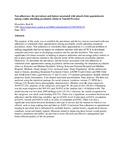| dc.description.abstract | The purpose of this study was to establish the prevalence and the key factors associated with non adherence to scheduled clinic appointments among psychiatIic youths attending outpatient psychiatric clinics. Non adherence to scheduled clinic appointments is a worldwide problem of striking magnitude that has an impact on treatment outcome with rates of 50 % in developed countries and lower rates in developing countries and for specific disorders. This study has significance for future research, in helping to improve adherence and encourage policy makers to put in place interventions tailored to the specific needs of the adolescent psychiatric patients.
Objectives: To determine the prevalence and the factors associated with non adherence to scheduled clinic appointments among psychiatric adolescents attending the outpatient psychiatric clinics at Kenyatta and Mathare Hospitals.
Setting: Kenyatta National Hospital and Mathare Hospital.
Methods- Study design: Cross sectional study.
Study Population: All the adolescents, male or female, attending Outpatient Psychiatric
Clinics at KNH Youth Clinics and MH Child and Adolescent Clinics aged between 13
and 22 years. 173 patients participated.
Sample method: purposive
Study instruments: A developed structured questionnaire.
Data analysis: The data was analyzed using the statistical package for social sciences (windows version 17; SPSS Inc), Chicago US.
Results
Socio-demographic characteristics: Mothers were the main caregivers :0=99 (57.2%), majority of the caregivers were aged 30- 40 years n=101 (58.4%). Chnstiaeity was the main religiorr n=Ief 995.4%) and 50.95% of the families had 1-4 children n=88. The modal income was less than 2500 shillings n=61 (35.3%). Likewise, the modal occupation for the caregivers was small scale farming 934.7%). There was a significant association between non adherence and the following variables: age p==O.036, level of education p=0.014, occupation p=O.016, income p=O.018 as well as severity of symptoms p=O.042. There was also a significant association between attendance and type of service and the manner in which it was offered- such as long waiting time and lines p= 0.025.
Conclusion
Non adherence to appointment keeping is prevalent and is influenced by multiple factors:- patient factors, organization factors, condition, social and family support. Measures aimed at improving these factors would greatly improve attendance and follow up and lead to more efficient and effective management and better efficient quality of life for patients. | en_US |

